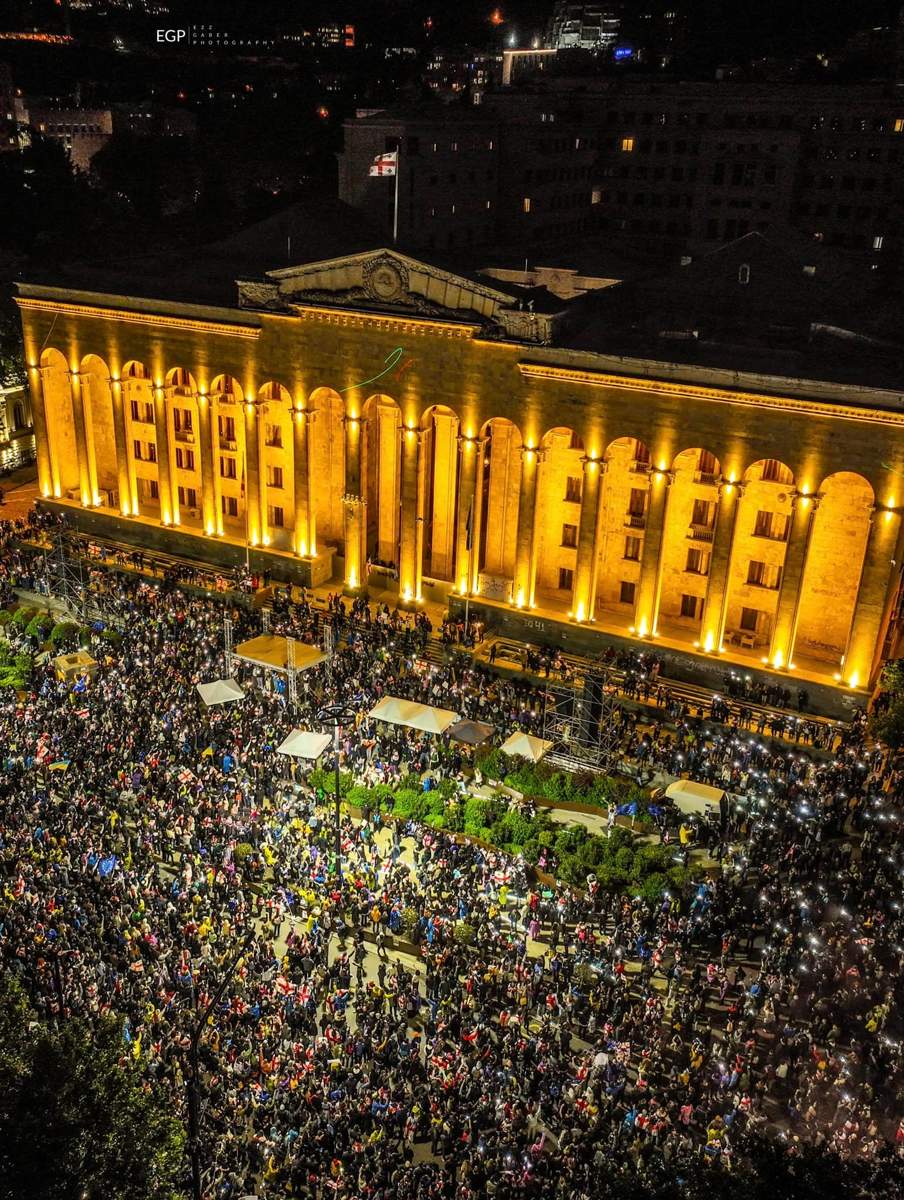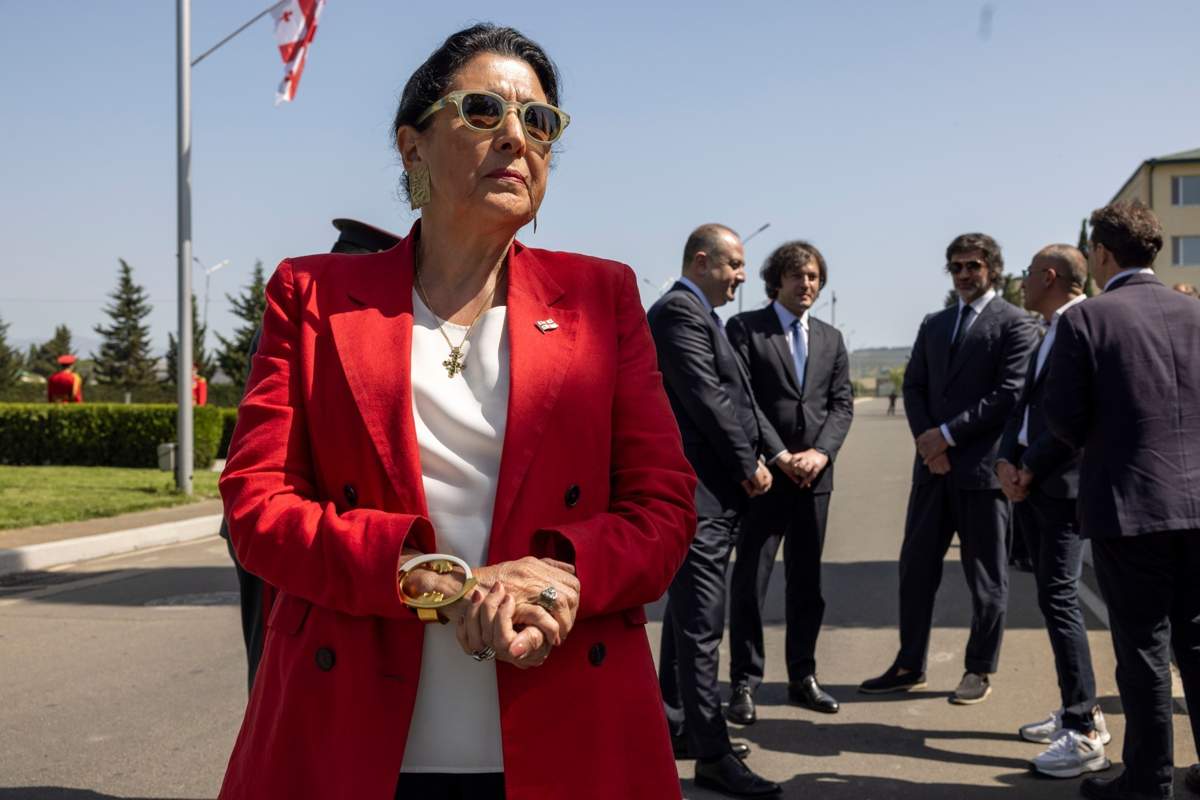Everything You Need to Know About "Russian Law"
The Georgian Parliament passed the contentious law «On Transparency of Foreign Influence» today, marking the culmination of a heated legislative process that began over a year ago

The law’s journey traces back to February 14, 2023, when the «People’s Power» faction, having split from the ruling party, unveiled their draft legislation aimed at regulating foreign-funded organizations.
Initially, the proposed 2023 law mandated the creation of a register for foreign agents of influence, with legal entities facing a fine of 25,000 GEL for non-compliance. On February 22, the «People’s Power» faction introduced an alternative draft, extending the «agent of foreign influence» designation to private individuals and imposing penalties of up to five years' imprisonment for violations.
Both versions of the draft law defined an «agent of foreign influence» broadly, encompassing individuals and legal entities involved in political activities, public relations, advertising, information services, or political consulting that represented foreign interests before Georgian government agencies. Proponents claimed the legislation mirrored the United States' Foreign Agent Registration Act (FARA) and sought to enhance transparency within non-governmental and media organizations.
Despite these assurances, the bills drew substantial criticism. On February 27, 2023, the Parliamentary Bureau referred both drafts to legal committees for review. Following committee hearings, the law was approved in its first reading on March 7, 2023, triggering widespread protests in Tbilisi. Opponents, including political parties, NGOs, and public organizations, argued that the law would stigmatize and discredit those listed as foreign agents, damaging their reputations.
International backlash was swift and strong. The United Nations, the European Union, the US State Department, and other international bodies condemned the bill. Amid escalating public opposition, the ruling «Georgian Dream» party withdrew the law on March 9, 2023, citing a failure to adequately communicate its necessity to the public. Subsequently, both the original and alternative drafts were rejected in the second reading.
The legislative saga reignited on April 3, 2024, when Mamuka Mdinaradze, executive secretary of the ruling «Georgian Dream» party, reintroduced the «Transparency Bill.» Despite the intense protests of March 2023, which led to the initial withdrawal of the so-called «Agents Law,» the parliamentary majority returned with an almost unchanged draft. The only significant alteration was replacing «agent of foreign influence» with «organization with foreign influence.» Under the new terms, non-business institutions and legal entities receiving more than 20% of their funding from foreign sources would be required to register as «organizations with foreign influence.»
The reintroduction of the law sparked renewed and sustained public protests. Demonstrations persisted for over a month, with students striking and demanding the bill’s withdrawal.
Despite government assertions that the law is domestically crafted and not related to Russian legislation, it faced severe criticism from Western partners. International media covered the unfolding events extensively, highlighting protests and police raids. EU leaders warned that the law’s adoption would distance Georgia from European integration.
The European Parliament condemned the bill on April 25, with a resolution supported by 425 MEPs, warning that the law’s presence would hinder Georgia’s EU accession negotiations. Public protests continued, drawing over 100,000 participants on April 28, according to Visioner. A counter-protest by the ruling party followed, involving civil servants and regional supporters.
Despite the European Parliament’s resolution, the law underwent a second reading on April 30, leading to further confrontations and arrests. The use of water cannons, tear gas, and pepper spray marked the dispersal of protesters. The second reading was approved on May 1 with 83 votes in favor and 23 against, with opposition members present this time.
International condemnation grew. European Commission President Ursula von der Leyen, US State Department officials, and NATO Secretary General Jens Stoltenberg, among others, expressed concerns about the law’s implications for democratic values and Georgia’s EU and NATO aspirations.

Protests continued with the «European March» on May 11, attracting up to 200,000 participants. Demonstrations persisted near the parliament, culminating in a tense session on May 14, where the law was adopted in the third reading after a brief committee session. The Parliament activated the red level of security, barring entry except for designated personnel.
US Assistant Secretary of State Jim O’Brien visited Georgia on May 14, urging peaceful protests and warning that non-compliance with EU norms could result in sanctions affecting responsible individuals and their families. Foreign ministers from the Baltic states and Iceland echoed these sentiments during their visit on May 15, emphasizing the law’s inconsistency with EU values.
President Zurabishvili reiterated her opposition to the law, refusing to engage in negotiations with the government. Despite extensive protests and international appeals, the ruling party proceeded with the law, marking a significant and controversial moment in Georgia’s political landscape.
What Happens After the Adoption of the Law
On May 14, the Parliament of Georgia voted for the third reading of the law «On Transparency of Foreign Influence» and approved it by 84 votes to 30. Deputies of the ruling party «Georgian Dream» and parliamentary faction «People’s Power» supported the law, while opposition MPs voted against it. Despite being approved in all three parliamentary hearings, the law has not yet entered into force. To become law, it requires the signature of the President of Georgia, or in specific cases, the chairman of the parliament.
According to the Constitution of Georgia, the draft law passed by Parliament in three readings is finally sent to the President for approval and signature.

President Salome Zurabishvili announced her veto during a briefing at the Orbelian Palace, stating, «Today I vetoed the Russian law. This law is, in its essence, in its spirit, a Russian law, which contradicts our constitution and all European standards and represents an obstacle to the European path. The veto is legally correct and will be submitted to the Parliament today. The law is not subject to any change, any improvement. This law should be abolished.»
Following the veto, the Parliament must vote. If the veto is overridden, requiring 76 out of 150 votes, the law is sent back to the President for signature. The President cannot veto the law a second time; she can either sign it or let it pass into law through inaction, in which case the Chairman of the Parliament will sign it.
Political experts and representatives are awaiting the conclusion of the Venice Commission regarding the law. The Venice Commission’s recommendation report, expected within days, will be sent to Parliament. The President of the Parliamentary Assembly of the Council of Europe, Teodoros Roussopoulos, has urged Parliament to consider these recommendations, criticizing the adoption of the bill without waiting for the Commission’s input.
Prime Minister Irakli Kobakhidze indicated that Parliament would consider the Venice Commission’s recommendations during the veto override process. Should the law be fully adopted and implemented, Western partners, including the US and EU member states, have indicated that appropriate measures will follow.
On May 14, during an official visit to Georgia, US Assistant Secretary of State Jim O’Brien warned that if the law passes, travel and financial restrictions might be imposed on legislators, as the law does not align with European values. American and European officials have repeatedly urged Georgian lawmakers and the government to withdraw the law through statements and letters.
While discussions of sanctions are ongoing, the specifics will become clearer once the veto override procedure is complete and the law’s final status is determined.
Authors: Davit Beradze, Salome Papalashvili, Forbes Georgia

